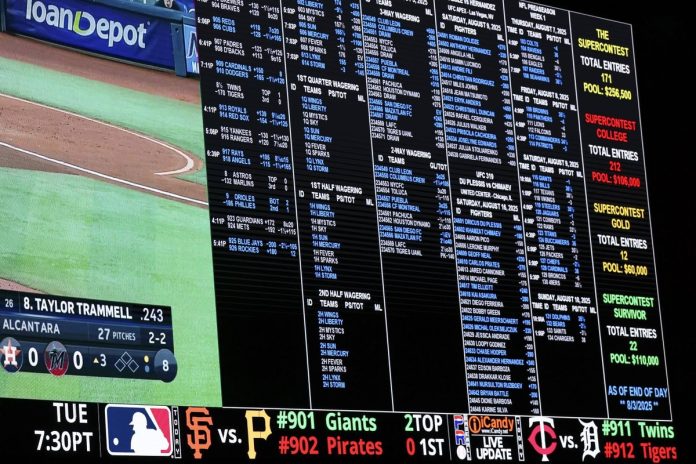No American sports league has been fully insulated from gambling scandals since the Supreme Court overturned a federal ban on sports betting in 2018. The NFL, NBA, MLB, and NHL have all confronted policy violations resulting in punishments ranging from fines and suspensions to league bans and even federal indictments.
To better understand how betting has affected players, The Athletic compiled responses from its anonymous player surveys this year.
Here are the key takeaways.
What type of harassing messages have players received since sports betting was legalized?
MLB: 78 percent of the 133 players The Athletic anonymously surveyed said legalized sports betting has changed how fans treat them or their teammates. Pitchers Liam Hendricks and Lance McCullers Jr. said they and their families were targeted with death threats.
“I’ve received (something) as simple as a Venmo request with a threat on it that says, ‘You owe me $9,000 because you blew the game – I need you to send me that money or I’m going to find your family,’” one veteran pitcher said. “That’s too far. We’ve communicated as players to MLB security that we need to get a handle on this before it gets out of control. I don’t want to say this, but something bad is going to happen and it’s going to be like, ‘We told you so.”
“It’s insane,” said one National League position player. “Nowadays it’s ‘f— you, f— your family.’ S—, it’s a bad day, I’m sorry. It’s not like I called you and said, ‘Bet on me today.’ You’re making the fans expect us to go 4-for-4 every day.”
NBA: Multiple NBA stars have been outspoken about fans’ messages that “crossed the line.” New York Knicks point guard Jalen Brunson recently said he’s been sent “some pretty messed up sh–. The worst things you’re thinking of, it’s worse than that.”
In The Athletic’s Anonymous NBA Player Poll this year, roughly one-third of the league — 150 of the 158 players polled — shared their opinions about sports gambling with our writers.
“I get 10 messages, DMs (direct messages) a game, (saying), ‘F— you, I’m gonna f— your family up,” one player said.
“I personally hate gambling. Hate everyone talking about parlays this, parlays that. I hate getting DMs in my Instagram talking about, ‘You f—– up my parlay.’ I hate people sending me threats because I messed up their parlay,” another said.
“Terrible. Hate them. Every game, no matter if it’s a good game or bad game, you’ve got motherf—— sending death threats, saying racist s—. Every game. I guarantee you, if I check right now, I’ll probably have something from this game. Every game. Everywhere. DMs, Twitter. People be tripping, bro,” a player said. “I hope it doesn’t happen, but it’s going to come to a point where players are going to be targeted because people have lost so much money on them. That’s what I think. But hopefully I’m wrong.”
NHL: While nearly 67 percent of 157 player respondents said they had not received more harassing messages since sports betting was legalized, several described getting toxic messages. One player said he gets at least one or two every day.
“Honestly, I’d say 75 percent of them are them being mad about something. ‘How did you let in that late goal? I had the under. Thanks a lot. You f—ing suck.’ Things like that constantly,” one goaltender said. “I feel like, as a goalie, we’re a little bit more exposed to it, too.”
“Together with a couple death threats and a few other things,” another player added.
Some fans take it a step further. Venmo and Cash App requests to players are common in the NHL, as fans often ask players to send them money.
NFL: Though players weren’t formally polled on this question, several have recently spoken about fans directing angry messages at them. New York Giants kicker Graham Gano said he’s received death threats from fans over poor performances. Arizona Cardinals running back Emari Demercado tweeted “[fans] don’t treat us like humans, we’re just pawns in the games they watch.” And Ravens quarterback Lamar Jackson said last season, “You gotta understand, we’re human too.”
Are players concerned about prop bets affecting the integrity of their sports?
NBA: The NBA has been notably affected by the rise in prop bets. Several NBA figures — including Portland coach Chauncey Billups, Heat guard Terry Rozier and the former player and coach Damon Jones — were arrested in a federal investigation for alleged activities like tipping non-public information to bettors and participating in an illegal gambling ring. Former Toronto Raptors forward Jontay Porter was banned for life after admitting he bet on NBA games, revealed his own injury status and manipulated his performance for prop-bet gains.
Almost 50 percent of players said the NBA’s partnerships with gambling companies is bad for the league, according to the anonymous survey. The NBA has tried to take measures to prevent manipulation: it reached an agreement with its betting partners to not offer any “under” prop bets on players who are on either a two-way or 10-day contract.
“NBA players compete at the highest level with the utmost integrity and are concerned that prop bets have become an increasingly alarming source of player harassment, both online and in person,” a spokesperson for the NBA players’ union said in August. “If tighter regulations can help minimize that abuse, then we support taking a closer look at them.”
Several players said the NBA was engaging in a clear conflict of interest. How can the league constantly promote gambling, then not expect players to engage in the activity, one player asked.
“I feel like anytime you click on TV or NBA TV, you always see something about spreads or gambling. As you know, some players have had problems with it. I feel like it’s kind of antagonizing players to think about it, and also, I think it’s a conflict of interest for the NBA, too. So, I think it’s bad,” another said.
NFL: This week, the NFL sent out a memo to all 32 teams detailing restrictions on bets tied to player injuries, officiating, single-player plays — such as a kicker missing a field goal — and pre-determined outcomes. The prohibitions outlined in the memo are not new and were essentially a reminder to teams in wake of recent gambling scandals, a league source confirmed to The Athletic.
Since the league suspended 10 players for violating gambling policies in 2023, it has not had any public betting scandals. And while the NFL says it is working to limit and, where possible, prohibit prop bets, there are hundreds of available micro-bets that fans can wager on across most major sportsbooks.
MLB: Tony Clark, the MLB union leader, has publicly called for the elimination of prop bets. Top agent Scott Boras echoed that statement. Cleveland Guardians pitchers Emmanuel Clase and Luis Ortiz were indicted for allegedly participating in a scheme that arranged specific pitch outcomes in exchange for bets.
Tucupita Marcano, an infielder for San Diego and Pittsburgh from 2021 to 2023, was banned for life last June for betting on baseball, and four other pro players were suspended for a year. One 11-year veteran said it’s naive to think that players can’t be tempted.
“The fact that it’s so easy to do and you can just go on your phone and just look up prop bets, everybody is gambling,” he said. “Every man that I know.”
Does your league educate you enough about its gambling policies?
NFL: An overwhelming 83 percent of respondents approved of the NFL’s education on its gambling policies. Although a few players noted there is still the occasional confusion, the NFL is generally effective in its education efforts.
“Yes. We hit on it a lot. At the end of the day, stay away from gambling. If you do that, you’re going to be fine. Gamble amongst each other, fine, but don’t put yourself in harm’s way,” one player said.
MLB: Commissioner Rob Manfred defended the league’s partnerships with gambling companies and MLB’s player education efforts during the World Series. He said the leagues “worked really hard” to provide players with resources.
But some executives think MLB could be doing more.
“I just want rules and regulations that protect our players, our umpires, our coaches and front office,” said Texas Rangers president of baseball operations Chris Young, who was once a high-ranking official in the commissioner’s office. “We’ve got such a great game, and you’d hate to have anything that can come in and soil it the way sort of this gambling thing has.”
“The threats that players are facing, and clearly some of the inducements that players are facing, are real and need to be dealt with,” Red Sox chief baseball officer Craig Breslow said.







